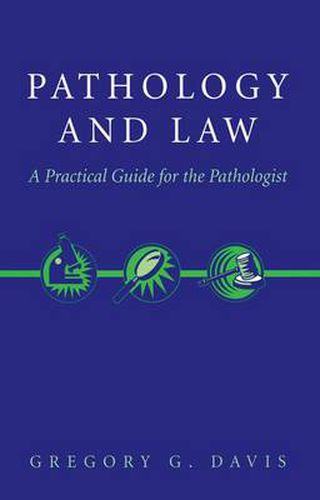Readings Newsletter
Become a Readings Member to make your shopping experience even easier.
Sign in or sign up for free!
You’re not far away from qualifying for FREE standard shipping within Australia
You’ve qualified for FREE standard shipping within Australia
The cart is loading…






This title is printed to order. This book may have been self-published. If so, we cannot guarantee the quality of the content. In the main most books will have gone through the editing process however some may not. We therefore suggest that you be aware of this before ordering this book. If in doubt check either the author or publisher’s details as we are unable to accept any returns unless they are faulty. Please contact us if you have any questions.
Almost all pathologists face legal issues when dealing with the specimens they work with on a day-to-day basis, whether it involves quality control and assurance in handling the specimens, facing the possibility of malpractice suits, or serving as an expert witness in a trial. Written in an easy to read, conversational tone, with a dose of good humor, this book fills the need for a handbook that discusses the full spectrum of legal issues that many pathologists face, written from a pathologist’s point of view. Organized in 12 user-friendly chapters, the book begins with a comparison of Law and Medicine and explains the basics of the American Legal System. It continues with discussions of the impact of law on the practice of pathology, including such topics as specimens with potential legal implications, the controversy of saving organs for teaching, procuring and saving specimens for toxicology testing and DNA confirmation in identity testing. A must-have section on malpractice suits covers reasons why patients sue, what to do if sued, and reducing the chance of being sued. The author addresses expert witness testimony, including how to be an expert witness, conflicts of interest, conduct in a courtroom, what to say and what not to say. Quality control and assurance as it applies to the pathologist is also discussed. Legal implications for the information age, including the use of internet and e-mail with regard to patient confidentiality is discussed in detail. Case samples are scattered throughout the text to illustrate the principles discussed. Every term is defined in the glossary.
$9.00 standard shipping within Australia
FREE standard shipping within Australia for orders over $100.00
Express & International shipping calculated at checkout
This title is printed to order. This book may have been self-published. If so, we cannot guarantee the quality of the content. In the main most books will have gone through the editing process however some may not. We therefore suggest that you be aware of this before ordering this book. If in doubt check either the author or publisher’s details as we are unable to accept any returns unless they are faulty. Please contact us if you have any questions.
Almost all pathologists face legal issues when dealing with the specimens they work with on a day-to-day basis, whether it involves quality control and assurance in handling the specimens, facing the possibility of malpractice suits, or serving as an expert witness in a trial. Written in an easy to read, conversational tone, with a dose of good humor, this book fills the need for a handbook that discusses the full spectrum of legal issues that many pathologists face, written from a pathologist’s point of view. Organized in 12 user-friendly chapters, the book begins with a comparison of Law and Medicine and explains the basics of the American Legal System. It continues with discussions of the impact of law on the practice of pathology, including such topics as specimens with potential legal implications, the controversy of saving organs for teaching, procuring and saving specimens for toxicology testing and DNA confirmation in identity testing. A must-have section on malpractice suits covers reasons why patients sue, what to do if sued, and reducing the chance of being sued. The author addresses expert witness testimony, including how to be an expert witness, conflicts of interest, conduct in a courtroom, what to say and what not to say. Quality control and assurance as it applies to the pathologist is also discussed. Legal implications for the information age, including the use of internet and e-mail with regard to patient confidentiality is discussed in detail. Case samples are scattered throughout the text to illustrate the principles discussed. Every term is defined in the glossary.